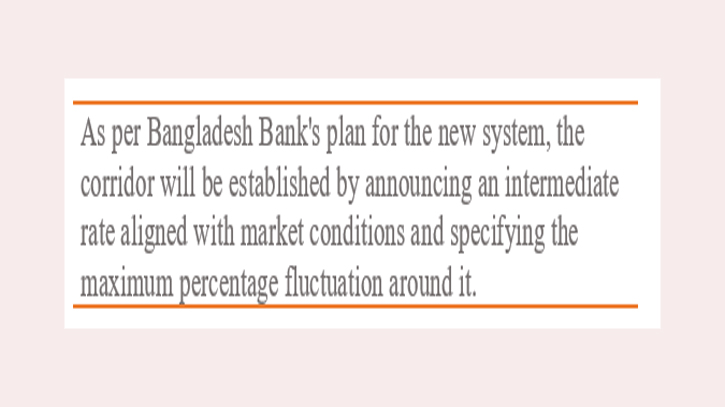
Photo : Messenger
Bangladesh Bank is set to implement a novel foreign currency exchange rate system. Departing from the current method of entirely relying on market forces, a new approach is in the works, altering the existing maximum rate setting system. The central bank has initiated efforts to introduce this innovative system, following the guidance of the International Monetary Fund (IMF).
As per Bangladesh Bank's plan for the new system, the corridor will be established by announcing an intermediate rate aligned with market conditions and specifying the maximum percentage fluctuation around it. Similar to the current structure for interest rates with SMART rates, exchange rates will also be governed by these defined corridors.
A recent country report on Bangladesh by the International Monetary Fund (IMF) shed light on the upcoming exchange rate regime. In addition, during a virtual press conference, IMF mission chief Rahul Anand announced that the organisation would extend technical assistance to facilitate the implementation of the new exchange rate regime. Governor Abdur Rouf Talukder further hinted at the BIDS annual conference that substantial progress is being made toward the development of the new exchange rate system.
Seeking anonymity, a senior official of Bangladesh Bank, told The Daily Messenger that the new system will provide an intermediate price of foreign exchange in line with the market. With this, the maximum percentage that can be fluctuated will be determined. The central bank will also monitor whether the banks are selling dollars within the limits.
Meanwhile, the IMF report said, moving to a fully floating exchange rate regime should be done very cautiously, so that this change does not create any problems. The change will come as part of a contractionary monetary and fiscal policy, which will improve Bangladesh's foreign exchange position.
The report emphasised the importance of maintaining adequate liquidity to enhance the flexibility of the exchange rate regime. It underscored that efficient management is crucial to mitigate potential risks associated with the transition. Notably, there exists a substantial risk, particularly the potential significant increase in the dollar rate, which could exert a considerable impact on inflation levels.
The report highlighted that there could be an escalation in foreign debt repayment costs, and the private sector may face heightened risks as a result of the shift in the exchange rate regime. Therefore, maintaining consistency between monetary and fiscal policies is crucial before initiating any easing in the exchange rate system. Despite these challenges, the report acknowledged that if the transition is successfully implemented, it could yield positive effects on the overall economy in the long term.
Currently, the exchange rate for the dollar is determined by the Bangladesh Bank, BAFEDA (the association of banks dealing in foreign currency), and ABB (the association of bank chief executives). In the recent three adjustments, the announced rate has seen a reduction of Tk 1, settling at Tk 109.50 for exports and remittances, and Tk 110 for imports. Notably, many banks are purchasing dollars from foreign exchange houses at rates ranging between Tk 120 to Tk 122. Furthermore, for imports, banks are charging as high as Tk 124 per dollar.
In such a reality, the IMF has suggested making the exchange rate of the dollar more flexible. However, once left to the market, prices can rise sharply and create inflationary pressures. That's why the IMF suggested a new system.
It's noteworthy that Bangladesh has received the second tranche of a $470 crore loan from the IMF. The release of the third installment is contingent on meeting specific conditions. However, the agency has modified the conditions related to reserve requirements before disbursing the first installment of the loan. Initially, the stipulation was that net reserves should amount to $26.8 billion at the end of December last year. The revised target has now been lowered to $17.8 billion.
Messenger/Fameema








